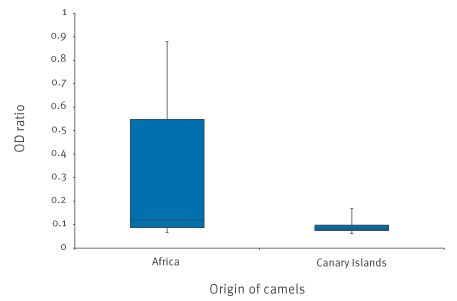
Presence of antibodies but no evidence for circulation of MERS-CoV in dromedaries on the Canary Islands, 2015
Eurosurveillance
Volume 20, Issue 37, 1 September 2015, 4p
Gutiérrez, C. , Tejedor-Junco, M.T., González, M., Lattwein, E., Renneker, S.
Abstract
In 2012, a new betacoronavirus, Middle East respiratory syndrome coronavirus (MERS-CoV), was identified in humans. Several studies confirmed dromedary camels to be a potential reservoir and a source for human infection. Camels located on the Canary Islands were included in those studies and ca 10% of them were positive for MERS-CoV-specific antibodies. However, these findings could not be correctly interpreted because epidemiological information was not provided. Thus, further investigations were necessary to clarify these results. A total of 170 camels were investigated in this survey, of which seven (4.1%) were seropositive by ELISA. Epidemiological information revealed that all seropositive camels had been imported from Africa 20 or more years prior. We conclude that seropositive camels had contact with MERS-CoV in Africa and that there is no shedding of the virus among camels or people around the farms on the Canary Islands. However, the presence of antibodies in the camel herds should be monitored. © 2015, European Centre for Disease Prevention and Control (ECDC).



